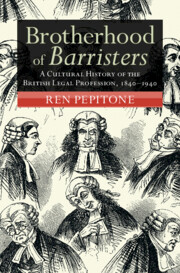Book contents
- Brotherhood of Barristers
- Modern British Histories
- Brotherhood of Barristers
- Copyright page
- Dedication
- Contents
- Figures
- Preface: A Primer on the Bar
- Acknowledgments
- 1 Introduction
- 2 The Metropolitan Inns
- 3 The Culture of the Bar
- 4 Gentlemanliness, Etiquette, and Discipline
- 5 Overseas Students
- 6 Women and the Bar
- Epilogue
- Bibliography
- Index
5 - Overseas Students
Published online by Cambridge University Press: 11 April 2024
- Brotherhood of Barristers
- Modern British Histories
- Brotherhood of Barristers
- Copyright page
- Dedication
- Contents
- Figures
- Preface: A Primer on the Bar
- Acknowledgments
- 1 Introduction
- 2 The Metropolitan Inns
- 3 The Culture of the Bar
- 4 Gentlemanliness, Etiquette, and Discipline
- 5 Overseas Students
- 6 Women and the Bar
- Epilogue
- Bibliography
- Index
Summary
This chapter examines the Inns’ largest and most on-going source of concern regarding radical politics, Indian nationalists, whom the Inns sometimes conflated with Indian students more generally. Beginning in the mid-nineteenth century, men from throughout the empire, but in greatest number from India, came to London to study law. By the early twentieth century, burgeoning colonial nationalist movements gained visibility for their causes, sometimes through violent actions in the colonies or in London. Members of the Inns came to distrust the potentially radical politics of their overseas members, equating all imperial subjects with anti-British actions. The societies collaborated with the British government to consider quotas limiting the number of Indian students in London. They debated whether or not colonial students were capable of being trained to be self-regulating subjects who would willingly submit to and replicate existing structures of power.
- Type
- Chapter
- Information
- Brotherhood of BarristersA Cultural History of the British Legal Profession, 1840–1940, pp. 121 - 156Publisher: Cambridge University PressPrint publication year: 2024

